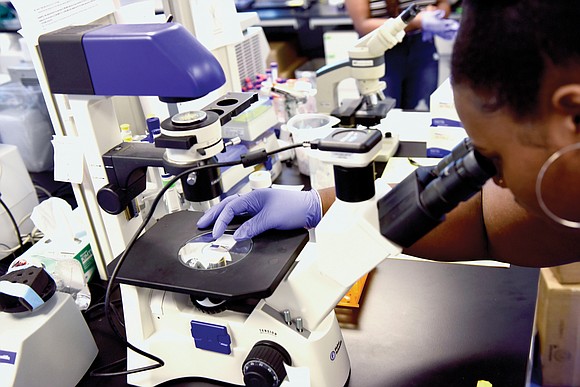Hampton University studying cancer risks, testing for black women
Matt Jones/Daily Press via AP Member Exchange | 7/4/2019, 6 a.m.

HAMPTON Luisel Ricks-Santi keeps the medical family tree of one of the participants in her study taped to the door of her office in her lab at Hampton University. There are four slashes among the women’s siblings, others among her immediate family, and most family members’ symbols are partially colored in.
Each partially filled circle represents a cancer diagnosis. Each slash indicates a death.
Although white women get breast cancer more frequently, it’s usually diagnosed later and is more severe in African-American women. Breast cancer death rates among black women were about 40 percent higher than among white women between 1999 and 2013, according to the Centers for Disease Control.
Dr. Ricks-Santi, director of the Hampton University Cancer Re- search Center, and another Hampton colleague, John McDonald, recently received a $446,000 grant from the National Institutes of Health to study the genetics behind breast cancer diagnoses in African-American women.
In particular, they’re trying to refine genetic tests that don’t seem to be as effective for black women as white women.
“I wanted to make sure that there was equity in the way that genetics and genomics was being applied across populations,” Dr. Ricks-Santi said.
She has a long-standing interest in cancer research, dating back to when she was a kid. Her family has a history of cancer; her father has prostate cancer.
That led her to pursue an undergraduate degree at Hampton University and a Ph.D. from Georgetown University. She worked as a post-doctoral fellow in a joint cancer studies program between Georgetown and Howard University.
There, she saw a trend among genetic tests for breast cancer, particularly the most common ones, BRCA 1 and 2. They are sometimes an indicator for some of the hardest to treat forms, and they’re also correlated with other kinds of cancer in men and women.
At Georgetown’s cancer center, which Dr. Ricks-Santi said served mostly white and affluent patients, BRCA tests often helped doctors decide if women were candidates for preventative treatment or if they needed additional testing.
At Howard’s cancer center, which served more black patients, BRCA tests often came back inconclusive.
This, Dr. Ricks-Santi said, makes it hard for oncologists to come up with specific, informed approaches for patients of color.
“You can’t do that if you’re not identifying the right risk factor, the right gene,” said Melissa Gomes, a mental health nurse practitioner and a co-investigator on the study. “You can’t make that personalized approach if it wasn’t based on a population that included you.”
The study that Dr. Ricks-Santi and Dr. McDonald are leading uses family history and genetic data from 300 breast cancer patients at Howard, along with relatives without cancer diagnoses and other types of cancer.
Dr. Ricks-Santi will conduct statistical research to find candidate genes that could provide a better test.
Dr. McDonald, an assistant professor of physics, then will conduct the laboratory phase of the study, injecting those genes into cancer cells in Petri dishes to determine exactly what kind of effect they have.
They’re also working with Hampton University students on the project, who will be paid with grant money.
“It’s nice to create that pipeline of researchers that look like the population we want to study,” Ms. Gomes said.
This round of funding lasts for three years. But they already are looking toward the next phase.
That’s where Ms. Gomes’ experience comes in. Her background is clinical psychiatry. She sees patients four days a week.
In a second study, once they’ve isolated some possible genes, they want to control for those genes and then investigate social circumstances that might contribute to breast and other kinds of cancer.
Ms. Gomes hopes to use her background in psychiatry and patient care to help build connections in Hampton Roads in addition to helping with the social research.
“Nurses are considered one of the most trusted health professionals,” Ms. Gomes said. “I think that the community trusts us and they value our opinion.”
Dr. Ricks-Santi is hopeful about this holistic approach, citing her father’s own experience.
Because of the small size of his tumor, doctors and the family took a more wait-and-see approach to treatment. He moved to Puerto Rico for six months to relax.
It seemed to work. His prostate- specific antigen levels, an indicator of that kind of cancer, dropped significantly and have stayed stable.
“It’s scary and exciting,” Dr. Ricks-Santi said. “There are so many possibilities.”







